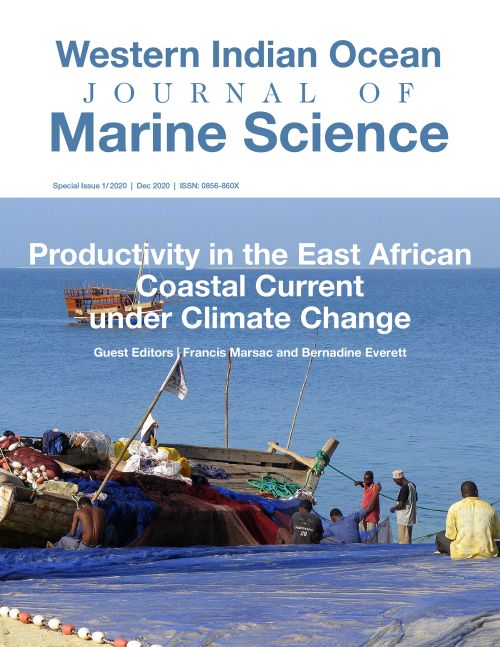Main Article Content
Age, growth and mortality of the anchovy Stolephorus commersonnii (Lacepède,1803) (Clupeiformes) caught off the coast of Tanga, Tanzania
Abstract
The population dynamics of Stolephorus commersonnii (Lacepède, 1803) from a ringnet fishery operating off the northern coast of Tanga Region were evaluated based on monthly length-frequency data collected from August 2016 to August 2017. The total length (TL) and total weight (TW) of 14,410 individuals ranged from 22 to 130 mm and from 0.39 to 14.64 g respectively. S. commersonnii exhibited a negative allometric growth pattern with the length-weight relationship model: W = 0.00001 x L2.886. The von Bertalanffy growth function was Lt = 86.03 x (1 – e–1.19(t – (–0.01))) using ELEFAN I from the FiSAT II software tool package. Growth performance index and longevity were estimated at (ɸ) = 3.9 and Tmax = 2.5 yrs, respectively. The total (Z), fishing (F) and natural (M) mortalities were determined at 1.39, 0.53 and 0.86 yr-1, respectively. The current exploitation rate (Ecur) was estimated at 0.38. S. commersonnii exhibited a year-round breeding pattern, with two recruitment peaks in March and June/July. Length-at-first-capture (Lc50) and length-at-first-sexual maturity (Lm50) were 40.51 and 57.35 mm TL, respectively, suggesting growth overfishing. The stock of anchovy indicates an overfishing scenario requiring management intervention such as reducing fishing effort levels, increasing mesh sizes and introducing seasonal closures during peak spawning periods.





